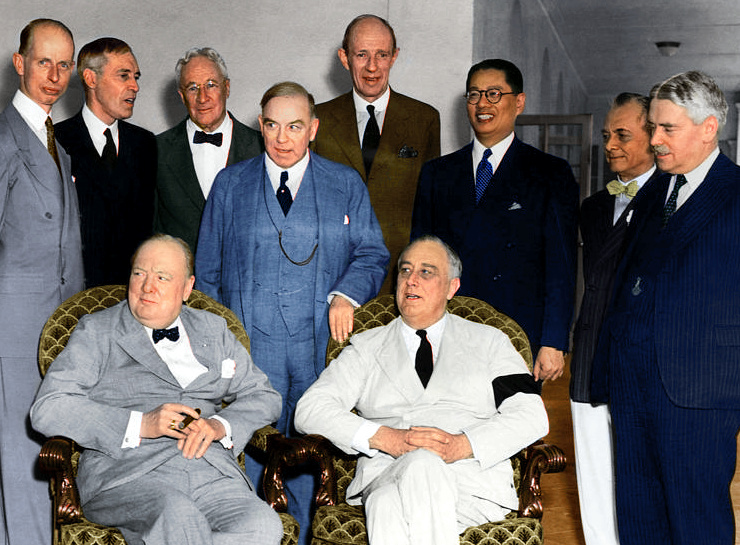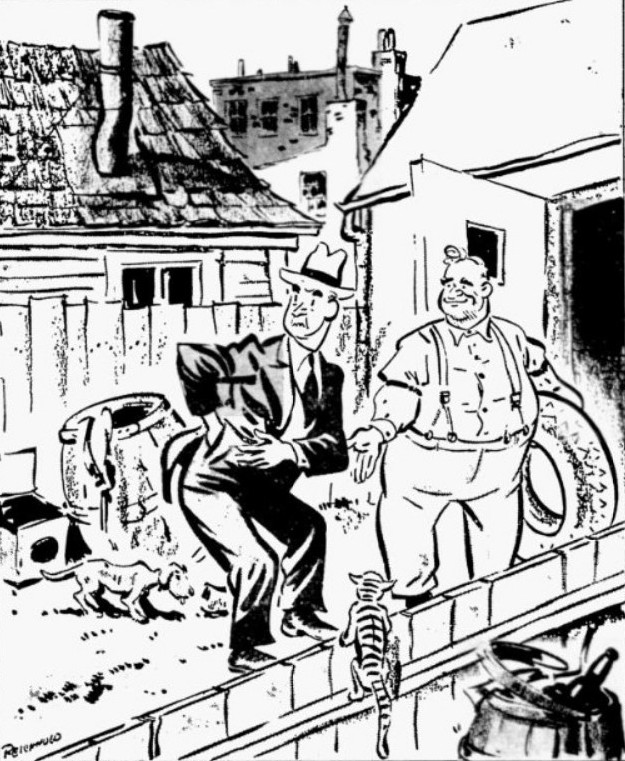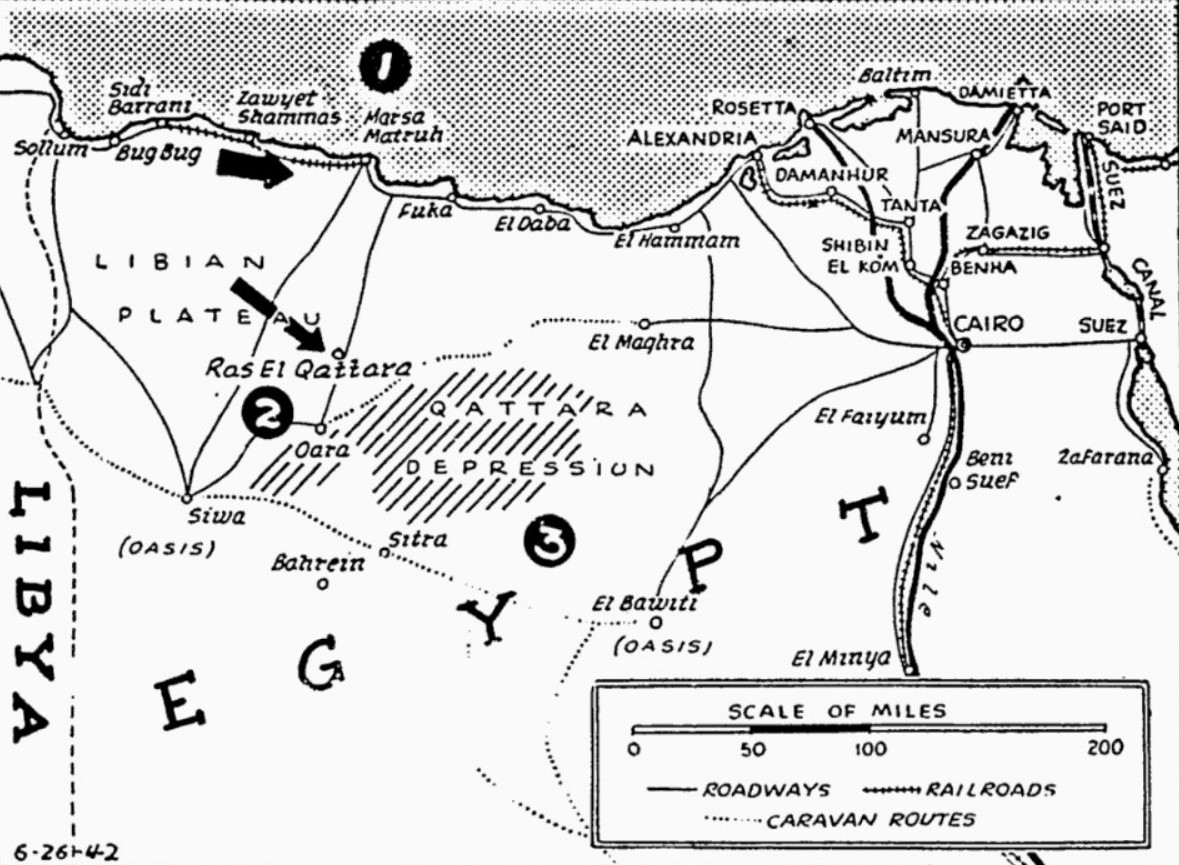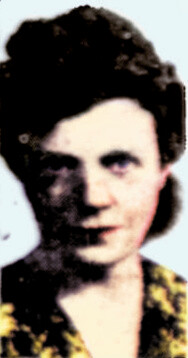Pacific War Council

Members of the Pacific War Council as they met at the White House to review the world situation. Seated are Prime Minister Winston Churchill and President Roosevelt. Standing (L-R) are Dr. Eelco van Kleffens, Netherlands Foreign Minister; Owen Dixon, Australian Minister; Leighton McCarthy, Canadian Minister to the United States; W. L. Mackenzie King, Canadian Prime Minister; Lord Halifax, British Ambassador to the United States; Dr. T. V. Soong, Chinese Foreign Minister; Manuel Quezon, President of the Philippines, and Walter Nash, New Zealand Minister to the United States.
Roosevelt-Litvinov talks stir second front hopes
By Lyle C. Wilson, United Press staff writer
Washington –
President Roosevelt and Prime Minister Winston Churchill have conducted “extended and most important conferences” with Soviet Ambassador Maxim Litvinov in their current formulation of grand strategy designed to win the war, the White House disclosed today.
The disclosure that Litvinov had met and talked with the two Anglo-American leaders seemed to indicate that an eventual second land front in Europe, long sought by the Soviet Union, was still uppermost in the current regulations.
The United States and Britain have formally committed themselves to Russia as recognizing the urgency of creating a new front in Europe that would relieve German pressure on Soviet lines.
White House Secretary Stephen T. Early also disclosed that while the President and Mr. Churchill were talking to Litvinov:
Conferences with military, naval and air officers – meaning those of Britain, the United States and Russia – are taking place simultaneously.
Mr. Early disclosed Russian participation in the important Roosevelt-Churchill war planning in response to questions concerning the importance attached by the White House to a conference among T. V. Soong, the Chinese Foreign Minister; the President and the Prime Minister. Mr. Soong yesterday asked the two leaders for more air support for China.
Asked whether Russian representatives had participated in the Roosevelt-Churchill discussions, Mr. Early said:
The Russians had figured in it from the beginning and still are.
Mr. Early disclosed that Secretary of State Cordell Hull had participated in the leaders’ conversations with Litvinov.
Pressure for a vigorously active Anglo-American fighting front against Germany in Europe appeared to be increasing enormously under impact of bad news from practically all war theaters.
Mr. Churchill, whose visit here has been marred by the fall of Tobruk and Axis penetration of Egypt, is believed to be as eager as any man for the drive to begin. He is under hot fire at home and must answer to Commons when he returns to London.
President Roosevelt and Mr. Churchill may have agreed on a shock for the Axis and a pleasant surprise for the peoples of the United Nations in their conferences. There is no hint of what they have agreed upon, but yesterday’s Pacific War Council sent conferees away smiling.
Dr. Eelco van Kleffens, Foreign Minister of the Netherlands government-in-exile, arrived by Clipper only in time to attend the council. He was almost exultant after the White House meeting.
He explained:
While I cannot go into the details, I want to emphasize one point – when I say encouraging, it is not just a matter of routine, but I have very definite reasons for saying so.
There is no denying, however, that the war is going against the United Nations as of today. Bad news from North Africa, Sevastopol and Kharkov is no more disquieting to Americans than the extraordinary mystery in which the authorities have packaged the Aleutian Island situation. Jap units are digging in there on fog-shrouded bases. The tantalizing uncertainty of the Aleutians has become more disturbing daily as the administration has permitted almost a week to elapse since giving the public any fresh news.
Urges Martinique seizure
On June 21, the Navy Department issued the latest word the public has had, a disquieting revelation that the Japs had established themselves in tents and temporary shores establishments at Kiska and that there was a “small force” of Jap ships in the harbor. The Navy is believed to know with reasonable accuracy how many ships and how many Japs are at Kiska. The fact that the numbers are not revealed causes speculation regarding the reasons for suppressing the information.
Even more immediately and painfully effective against the war effort is the second front established against the United States in her own waters by German and Italian submarines.
Proposing the seizure of Martinique, Senator Harry F. Byrd (D-VA) asserted in the Senate that “competent experts” believe enemy submarines are based within striking distance of American coasts and that:
Every indication is that these bases are in and around the Caribbean Sea.
And he said government officials were his authority for saying that:
The sinking of cargo ships has been in excess of their construction since Pearl Harbor.
Charge hurled at Navy
At least one other member of Congress, Senator Allen J. Ellender (D-LA), is charging that the Navy is suppressing the true story of what is going on in nearby Atlantic waters, a charge which suggests that more ships are being sunk than the Navy will concede.
And there is some agitation here for a new high command setup which would put President Roosevelt – with the consent of Britain, the Soviet Union and China – in charge of overall war policies.
Mr. Churchill not only met yesterday with an augmented Pacific War Council at which Canadian Prime Minister Mackenzie King was present, but with a bipartisan group of House and Senate leaders and committee chairmen.
The Pacific Council conferees uniformly pronounced their meeting with Mr. Roosevelt and Mr. Churchill as most heartening and encouraging. The Congressional reaction was less uniformly and positively favorable although the Prime Minister assured the Congressmen that he was confident that Britain could hold Egypt against Germany’s mechanized drive.
Recall Singapore statement
In that connection, some persons recalled one of Churchill’s conferees on his previous visit here asked him directly:
Can you hold Singapore?
The questioner subsequently reported that the Prime Minister had replied:
If we’re not holding Singapore five or six months from now, I’ll be enormously disappointed.
The great naval base fell one month later.
Mr. Churchill was reported by members of the Congressional delegation to have minimized the adverse significance of the British withdrawal to the Egyptian border.





